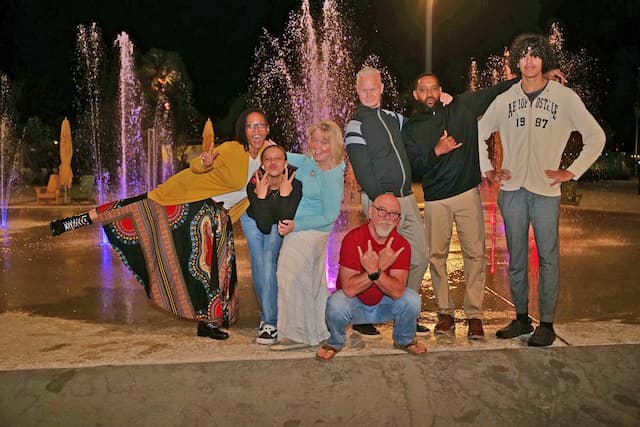Are You a Prisoner of Hope?

Are you a prisoner of hope?
I am. It’s just not in me to give up. I simply cannot not hope.
Which is not to say my hopes aren’t dashed.
I hoped one son would get the start. He didn’t. I hoped another one would get a lead. He didn’t. I hoped my husband and I would agree. We didn’t. I hoped for 30 book reviews. But I have 23. I hoped one friend would accept my invite. She didn’t. I hoped I could squeeze in a walk before dark. I couldn’t.
Those are just a sample of this week’s mostly little disappointments. Some are bigger.
I hoped a friend would get better. She isn’t. I hoped for a loved one to return. He hasn’t (yet). I hoped to have and homeschool four kids. I had two and homeschooled none.
For all these things, I hoped, prayed, and was disappointed. Yet I remain a prisoner of hope.
How can that be?
What Does it Mean to Hope?
Scripture uses the word “hope” when God has spoken. In other words, hope is confident assurance that God will deliver on what he promised. In the examples above, I didn’t have a promise from God. Not for my son to start the game or a walk before dark or a friend to come along.
Bible teacher Alec Motyer made a helpful distinction between the ways we use the “hope.” In earthly terms, hope is certainty of time and uncertainty of event—as in, “I hope it will be sunny tomorrow.” But biblically, hope is uncertainty of time and certainty of event—as in, “God will dwell with us.”
Biblically, hope is uncertainty of time and certainty of event.
Alec Motyer, “Psalms by the day”
To hope biblically is to bank on God’s promises, even though we don’t know when they will come true.
We don’t need to align the two ways we use the word “hope,” but we should keep both meanings in mind. If we do, we can understand how we can at once have earthly hopes dashed so many times and yet remain prisoners of hope. And I know I’m not alone—that I’m not the only prisoner of hope.
Because as theologian Sinclair Ferguson explains, “the Christian is, by definition, a hopeful person.”
Return to Your Stronghold, O Prisoners of Hope!
“As for you also, because of the blood of my covenant with you, I will set your prisoners free from the waterless pit. Return to your stronghold, O prisoners of hope; today I declare that I will restore to you double.” —Zechariah 9:11-12
Before we get to our stronghold, we must look into the waterless pit.
It was a common custom, in the East, to put prisoners into deep pits which had been dug in the earth. The sides were usually steep and perpendicular, and the prisoner, who was dropped down into such a pit, must remain there without any hope of escape. According to our text, there was no water there, and, apparently, no food. The object of the captors was to leave the prisoner there to be forgotten as a dead man out of mind. Have you ever realized anything like that?
Charles Spurgeon, “Prisoners of Hope“
Have you? Have you felt such a place of despair that seemed to have no way of escape?
The besieged Jews hearing Zechariah’s word from the Lord must have envisaged a physical stronghold when he gave those words. The prisoners must have imaged a place of refuge, a sort of Helm’s Deep within Jerusalem’s gates.
But some of them, and all of us, read this verse and think of a spiritual fortress—the LORD Himself. For centuries before Zechariah prophesied, David wrote Psalm 18, which includes these words (18:2):
“The LORD is my rock and my fortress and my deliverer; My God, my strength, in whom I will trust; My shield and the horn of my salvation, my stronghold.”
We take refuge in Christ. We flee to him.
There is only one way out. Only by the blood of the covenant. Spurgeon again,
The people of God are set free from their bondage by the blood of the covenant. The blood of Jesus Christ has sealed, and ratified, and fulfilled the covenant of grace to all who believe in him
When we are delivered from the pit, close beside is the refuge. So, says Spurgeon “the moment you are drawn up out of the pit, run to the castle for shelter.”
His banner flying over it is love.
Love…hopes all things.
“Love…hopes all things.” —1 Corinthians 13:7
All things? What did Paul mean?
I think he meant that love hopes on, in all situations.
Because of the power and grace of God, love hopes in all situations, including situations that may seem hopeless in themselves.
—Philip ryken, “LOve Hopes“
Hope never gives up. I love how Ryken puts it.
Love never loses hope but is always hopeful about the goodness of God and about his power to work in someone’s life. Love does not give up on people when they are struggling. It does not give into despair in the face of difficulty. It does not declare that things can never change.
So when some discouraging voice, and it may even be the voice inside your head, says, “There’s no hope,” love answers back, “Oh, yes there is. There is always is. There’s always hope in Jesus.”
This is why I am an unflinching prisoner of hope. I am constrained by the God who is love to hope for softened hearts, for hearts of fathers turned to sons and sons to fathers, and hope of forgiveness and reconciliation. Therefore, I cannot not hope for repentance and healing and peace.
I am a prisoner of hope in Christ Jesus.
“When we give up on hope on a situation, that is not merely a failure of hope,” Ryken reminds. “It is a failure of love.” Because love always hopes.
This biblical hope is not wishful thinking. It is not having our problems solved and our wishes fulfilled—even our unselfish hopes and good wishes.
At its core hope looks beyond a cure for disease or a solution for a problem or an escape from pain. It looks beyond these things for an assurance from God that life has meaning in spite of its disease and problems and pains. It looks to the promise of the final victory of Jesus over all that hurts and kills.
Lewis Smedes
This is the kind of hope that will not let us down or disappoint. This hope that looks beyond does not put us to shame.
Hope Does Not Put Us to Shame
“Hope does not put us to shame, because God’s love has been poured into our hearts through the Holy Spirit who has been given to us.” —Romans 5:5
Here’s where we finally turn the Advent Week #1 hope corner onto Christmas Avenue.
The reason Paul gives in Romans 5:5 for this shameless hope is God’s love. God’s love has been not dripped or drizzled but poured into our hearts. How?
Through the Holy Spirit. Sinclair Ferguson explains,
Heaven is a world of love. From that heaven God sends the Spirit of his Son into our hearts. He brings heaven’s love down to earth and floods our hearts with a sense of it. We know we are loved. We are sure of our place in heaven because God the Father has given us his promise. But we are also sure of it because the Holy Spirit has brought the atmosphere and love of heaven down to us here and now!
Love incarnate—Jesus Christ—came down to earth at Christmas.
Sinclair Ferguson, “Love Came Down At Christmas”
And because he did, and because God is faithful to every single promise he ever made, I remain an unashamed prisoner of hope.
I don’t know when he will bring us into the glorious freedom of the children of God.
But I am unabashedly certain he will.
Come, Thou long expected Jesus
Born to set Thy people free;
From our fears and sins release us,
Let us find our rest in Thee.
Israel’s strength and consolation,
Hope of all the earth Thou art;
Dear desire of every nation,
Joy of every longing heart.
—Charles Wesley










